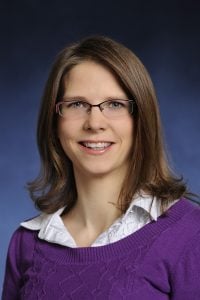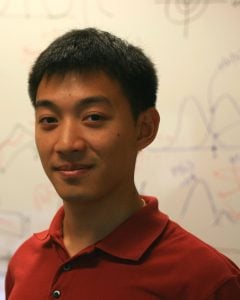
An Goffin, senior lecturer and associate director of undergraduate studies, has left the department to move to Connecticut with her family.
Goffin arrived in 2008 with a newly minted PhD in chemical engineering and quickly found her place as a beloved instructor and advisor. “Dr. Goffin put an incredible amount of effort into developing a strong education curriculum—not just for her classes, but also for the department as a whole. She had a significant impact on every single undergraduate that has come through the ChemBE program,” says Gabriella Russo, BS ’16, MSE ’18, who studied with Goffin and served as her teaching assistant.
 Goffin taught Process Design and Senior Lab, bringing to her classes new teaching tools and pedagogical strategies as well as the intellectual rigor and ability to analyze problems for which she was known throughout the department. She served on the ChemBE ethics and design committees and on the Whiting School’s curriculum committee; coordinated ChemBE’s participation in the school’s annual Design Day; assisted with data collection and editing for the department’s re-accreditation report; and was involved briefly with the department’s master’s program. She brought a high level of attention to safety and organization to every undertaking. Turning her role as junior faculty to a strength, she advocated fiercely for undergrads and for innovations to benefit them.
Goffin taught Process Design and Senior Lab, bringing to her classes new teaching tools and pedagogical strategies as well as the intellectual rigor and ability to analyze problems for which she was known throughout the department. She served on the ChemBE ethics and design committees and on the Whiting School’s curriculum committee; coordinated ChemBE’s participation in the school’s annual Design Day; assisted with data collection and editing for the department’s re-accreditation report; and was involved briefly with the department’s master’s program. She brought a high level of attention to safety and organization to every undertaking. Turning her role as junior faculty to a strength, she advocated fiercely for undergrads and for innovations to benefit them.
“She was young and fun and incredibly well-organized,” says Lise Dahuron, senior lecturer and director of undergraduate studies. “She relates to the students very well, but she’s also demanding and doesn’t baby them. When she helped somebody, she went all the way and made sure they had the support they needed.”

 Continuing the tradition of arriving as a ChemBE lecturer straight from earning a PhD, Sakul Ratanalert joined ChemBE as a full-time lecturer Aug. 1.
Continuing the tradition of arriving as a ChemBE lecturer straight from earning a PhD, Sakul Ratanalert joined ChemBE as a full-time lecturer Aug. 1.
Ratanalert, who earned his PhD at the Massachusetts Institute of Technology’s Department of Chemical Engineering in 2018 under the supervision of Mark Bathe and Gregory Rutledge, focuses his research on DNA origami. In this field of nanotechnology, DNA is used not as genetic material but as a self-assembling polymer. By programming the sequences of the DNA, the strands can stick to one another beyond the standard double helix to form 2D and 3D structures of arbitrary size and shape.
Motivated by the lack of well-formalized design rules, as well as by the need for a tool to enable the broader use of this nanotechnology, Ratanalert created and developed the software DAEDALUS, an algorithm to automate the design of DNA origami wireframes from CAD structures. He also developed innovations to the design of single-stranded DNA origami, programming the sequence of one strand of DNA to fold on itself to form the entire target shape. With this computational framework, he investigates the thermodynamics of the self-assembly process to understand further how design choices can affect how well the structures form.
Ratanalert will teach two courses each semester during the 2018-2019 academic year, including Senior Lab. The Livingston, NJ native earned a master’s degree in chemical engineering practice from MIT in 2013, and a BS in chemical and biomolecular engineering from Cornell University in 2011. At Cornell, he was a McMullen Dean’s Scholar and won an Outstanding Undergraduate Teaching Award.
“One of the main reasons I pursued a PhD was so I could teach,” Ratanalert says. “Here at Johns Hopkins, I hope to bring a lot of new ideas to the ChemBE classroom and help students to build the fundamentals they need to succeed in their careers.”